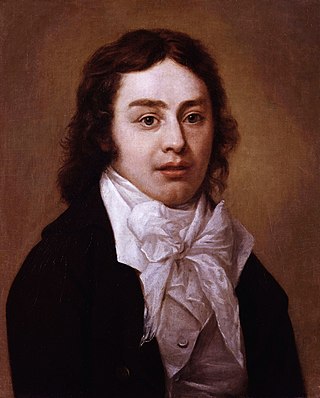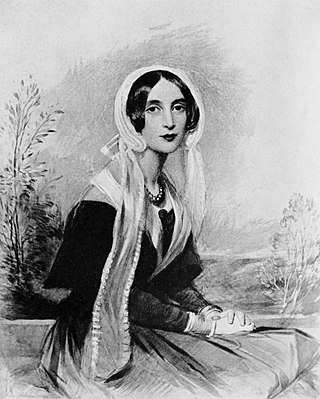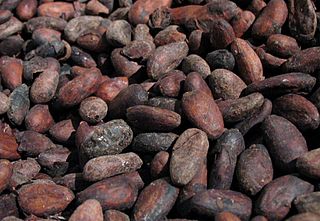Related Research Articles

Opium is dried latex obtained from the seed capsules of the opium poppy Papaver somniferum. Approximately 12 percent of opium is made up of the analgesic alkaloid morphine, which is processed chemically to produce heroin and other synthetic opioids for medicinal use and for the illegal drug trade. The latex also contains the closely related opiates codeine and thebaine, and non-analgesic alkaloids such as papaverine and noscapine. The traditional, labor-intensive method of obtaining the latex is to scratch ("score") the immature seed pods (fruits) by hand; the latex leaks out and dries to a sticky yellowish residue that is later scraped off and dehydrated. The word meconium historically referred to related, weaker preparations made from other parts of the opium poppy or different species of poppies.

Samuel Taylor Coleridge was an English poet, literary critic, philosopher, and theologian who, with his friend William Wordsworth, was a founder of the Romantic Movement in England and a member of the Lake Poets. He also shared volumes and collaborated with Charles Lamb, Robert Southey, and Charles Lloyd.

Laudanum is a tincture of opium containing approximately 10% powdered opium by weight. Laudanum is prepared by dissolving extracts from the opium poppy in alcohol (ethanol).

Paregoric, or camphorated tincture of opium, also known as tinctura opii camphorata, is a traditional patent medicine known for its antidiarrheal, antitussive, and analgesic properties.

Thomas Penson De Quincey was an English writer, essayist, and literary critic, best known for his Confessions of an English Opium-Eater (1821). Many scholars suggest that in publishing this work De Quincey inaugurated the tradition of addiction literature in the West.

A muffin is an individually portioned baked product; however, the term can refer to one of two distinct items: a part-raised flatbread that is baked and then cooked on a griddle, or a quickbread that is chemically leavened and then baked in a mold. While quickbread "American" muffins are often sweetened, there are savory varieties made with ingredients such as corn and cheese, and less sweet varieties like traditional bran muffins. The flatbread "English" variety is of British or other European derivation, and dates from at least the early 18th century, while the quickbread originated in North America during the 19th century. Both types are common worldwide today.

Christmas pudding is sweet, dried-fruit pudding traditionally served as part of Christmas dinner in Britain and other countries to which the tradition has been exported. It has its origins in medieval England, with early recipes making use of dried fruit, suet, breadcrumbs, flour, eggs and spice, along with liquid such as milk or fortified wine. Later, recipes became more elaborate. In 1845, cookery writer Eliza Acton wrote the first recipe for a dish actually called "Christmas pudding".
An anodyne is a drug used to lessen pain through reducing the sensitivity of the brain or nervous system. The term was common in medicine before the 20th century, but such drugs are now more often known as analgesics or painkillers.

Sara Coleridge was an English author and translator. She was the third child and only daughter of the poet Samuel Taylor Coleridge and his wife Sara Fricker.

Wood engraving is a printmaking technique, in which an artist works an image into a block of wood. Functionally a variety of woodcut, it uses relief printing, where the artist applies ink to the face of the block and prints using relatively low pressure. By contrast, ordinary engraving, like etching, uses a metal plate for the matrix, and is printed by the intaglio method, where the ink fills the valleys, the removed areas. As a result, the blocks for wood engravings deteriorate less quickly than the copper plates of engravings, and have a distinctive white-on-black character.

Eliza Acton was an English food writer and poet who produced one of Britain's first cookery books aimed at the domestic reader, Modern Cookery for Private Families. The book introduced the now-universal practice of listing ingredients and giving suggested cooking times for each recipe. It included the first recipes in English for Brussels sprouts and for spaghetti. It also contains the first recipe for what Acton called "Christmas pudding"; the dish was normally called plum pudding, recipes for which had appeared previously, although Acton was the first to put the name and recipe together.

Chocolate liqueur is a chocolate flavored liqueur made from a base liquor of whisky or vodka. Unlike chocolate liquor, chocolate liqueur contains alcohol. Chocolate liqueur is often used as an ingredient in mixology, baking, and cooking.

The River Greta is a river in Cumbria, England. It is a tributary of the River Derwent and flows through the town of Keswick. "Greta" derives from the Old Norse "Griótá", meaning "stony stream". The name is in records dating from the early 13th century, and also appears in Latinised form, as "Gretagila", at the time of Magna Carta.

Samuel Taylor Coleridge was an English poet, critic, and philosopher who consumed opium to address his health issues. His use of opium in his home country of England, as well as Sicily and Malta, is extensively documented. Coleridge's opium use led to severe consequences. Coupled with his health conditions, it harmed his life and adversely impacted his career.
Opium and Romanticism are well-connected subjects, as readers of Romantic poetry often come into contact with literary criticisms about the influence of opium on its works. The idea that opium has had a direct effect on works of romantic poetry is still under debate; however, the literary criticism that has emerged throughout the years suggests very compelling ideas about opium and its impact on Romantic texts. Usually these criticisms tend to focus on poets such as Samuel Taylor Coleridge, Thomas De Quincey and George Crabbe.

A New System of Domestic Cookery, first published in 1806 by Maria Rundell, was the most popular English cookery book of the first half of the nineteenth century; it is often referred to simply as Mrs Rundell, but its full title is A New System of Domestic Cookery: Formed Upon Principles of Economy; and Adapted to the Use of Private Families.

Colin Mackenzie was a nineteenth century writer, book producer, editor, translator and compiler. Mackenzie spent his adult life living and working in London, England. He wrote/helped produce works of non-fiction, including educational and informative works on chemistry, cookery, medicine, popular science, geography, history, economics and religion, the 'gentlemen's clubs' of London, a 'parliamentary pocketbook' in 1832 and a report on poverty with a particular focus on London.

Mushroom ketchup is a style of ketchup that is prepared with mushrooms as its primary ingredient. Originally, ketchup in the United Kingdom was prepared with mushrooms as a primary ingredient, instead of tomato, the main ingredient in most modern preparations of ketchup. Historical preparations involved packing whole mushrooms into containers with salt. It is used as a condiment and may be used as an ingredient in the preparation of other sauces and other condiments. Several brands of mushroom ketchup were produced and marketed in the United Kingdom, some of which were exported to the United States, and some are still manufactured as a commercial product.

Modern Cookery for Private Families is an English cookery book by Eliza Acton. It was first published by Longmans in 1845, and was a best-seller, running through 13 editions by 1853, though its sales were later overtaken by Mrs Beeton. On the strength of the book, Delia Smith called Acton "the best writer of recipes in the English language", while Elizabeth David wondered why "this peerless writer" had been eclipsed by such inferior and inexperienced imitators.
References
- ↑ Oxford English Dictionary
- ↑ The British Pharmaceutical Codex 1911
- ↑ A Cyclopædia of Several Thousand Practical Receipts: And Collateral Information in the Arts,...by Arnold James Cooley (1846) |sic|
- ↑ Don Juan, Canto 9
- ↑ Quoted in H. D. Traill, Coleridge, 1884. (English Men of Letters series)